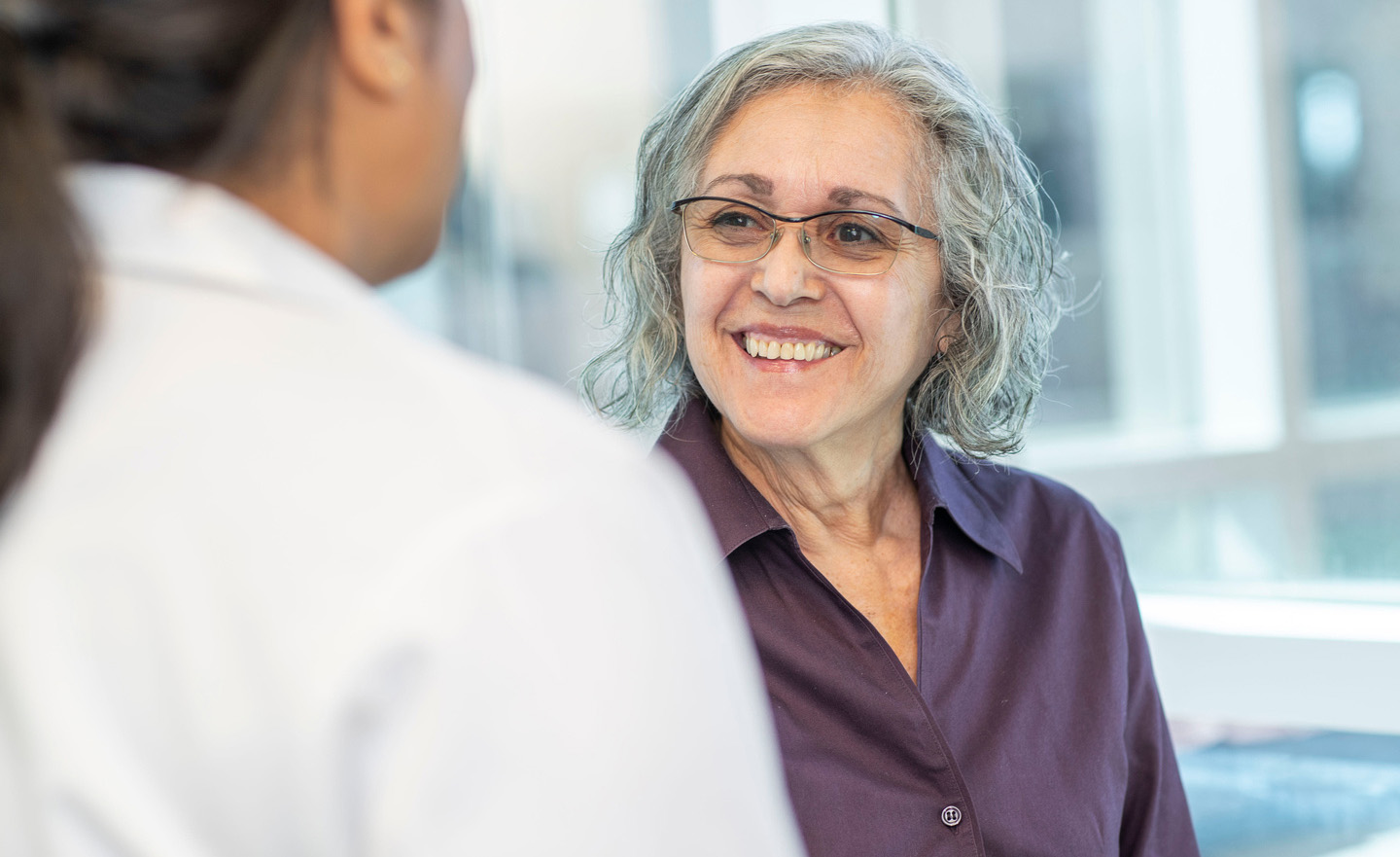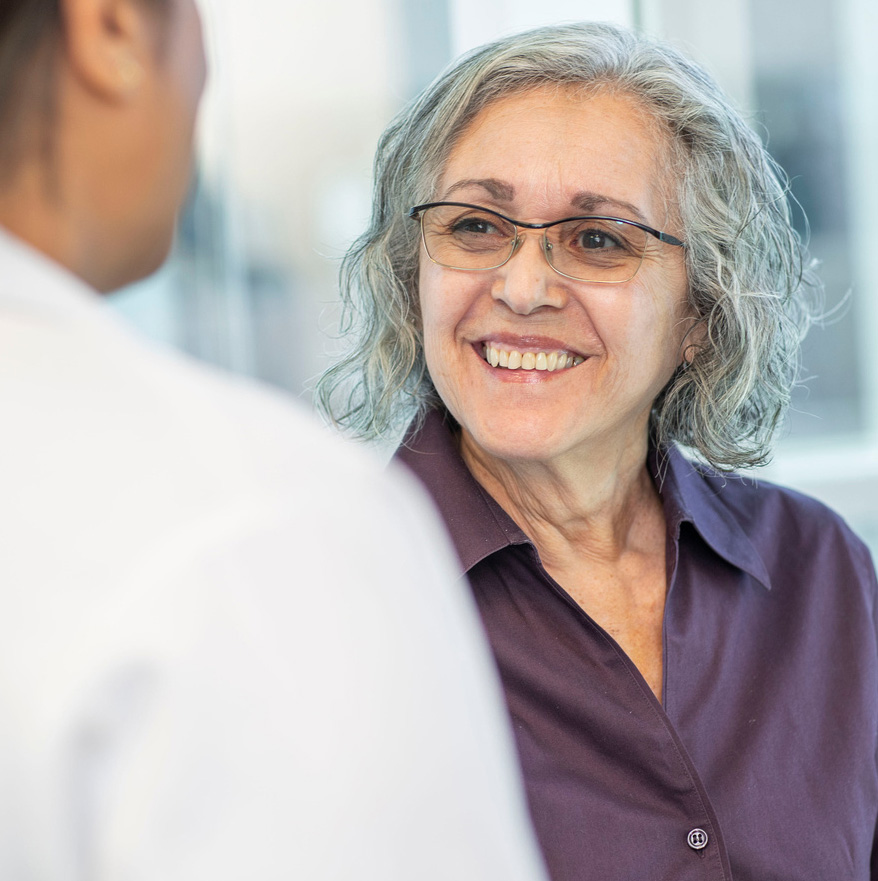

Manage Your Cancer Risk
- About Us
-
Cancer Care
-
Our Cancer Programs
- Adolescent and Young Adult Cancer Program
- Blood Cancer & Hematological Malignancy Program
- Blood Disorder (Hematology) Program
- Breast Cancer Program
- Cancer Genetics Program
- Cancer Risk Reduction and Education Clinic
- Cardio-Oncology Program
- Childhood Cancer Survivorship Program
- Endocrine Tumor Program
- Eye Cancer Program
- Gastrointestinal (GI) Cancer Program
- Genitourinary Cancer Program
- Gynecologic Oncology Program
- Head and Neck Cancer Program
- Liver Tumor and Cancer Program
- Lung Cancer Program
- Neuro-Oncology (Brain Tumor) Program
- Neurofibromatosis Program
- Pediatric Neuro-Oncology Program
- Pediatric Oncology Program
- Pediatric Sarcoma Program
- Pediatric Thrombosis Program
- Radiation Oncology
- Sarcoma Cancer Program
- Skin Cancer Program
- Supportive Cancer Care Program
-
Screening and Diagnosis
- Cervical Cancer Screening Guidelines
- Colorectal Cancer Screening
- Endometrial (Uterine) Cancer Screening Guidelines
- Hepatitis and Cancer
- HPV Vaccine and Screenings
- Liver Cancer Guidelines
- Lung Cancer Screening
- Mammogram
- Ovarian Cancer Screening Guidelines
- Prostate Cancer Screening Guidelines
- Skin Cancer Screenings
- Sun and Skin Safety
- Tobacco Use and Cancer
- Skin Cancer Screenings
- Cancer Genetics Program
- Cancer Survivorship Program
- Cancer Treatments
- Conditions
-
Our Cancer Programs
- Clinical Trials and Research
- Donate and Volunteer
- Education
- Patients and Families
- Appointments
- Doctors and Locations
-
Community Outreach and Engagement Program
- Message from COE Leadership
- South Texas Cancer Burden and COE Areas of Work
- Our COE Impact
- COE Community Advisory Board
- COE Publications
- Avanzando Caminos (Leading Pathways) Study
- Estudio Avanzando Caminos (Leading Pathways)
- San Antonio Firefighters Cancer Prevention Program
- STAR Immunotherapy Study
The cancer survivorship team at Mays Cancer Center, home to UT Health San Antonio MD Anderson Cancer Center, can help manage your risk. We provide personalized recommendations that lower the likelihood of new or recurring cancer and other ongoing medical conditions.
Managing your risk of cancer and other medical issues
After cancer treatment, your immune system might get weaker. This can make it harder for your body to fight off infections and germs. You also still need to be careful about common health issues like obesity and diabetes, which can affect your long-term health.
We recommend cancer prevention and screening services that meet your needs.
Additional steps you can take include:
Increasing physical activity
There are lots of ways to move more during your everyday activities. You can start with small changes, like parking your car at the far end of a parking lot so you have to walk further to reach your destination. You can also opt to take the stairs instead of an elevator.
Maintaining a healthy body weight
Another key factor in your wellness is healthy eating, which research has shown to help lower the risk of cancer, cancer recurrence and other chronic diseases. Steps toward achieving and maintaining a healthy weight include:
- Cutting empty calories: Reduce or remove processed foods that may contain excess fat, sugar and very few vitamins, minerals and fiber for your body.
- Focusing on whole foods: Choose vegetables, fruits, lean meats and whole grains to prevent cravings.
- Controlling portions: Restaurant portions and packaged foods frequently contain multiple servings. Ask for nutrition information and read labels to help you consume appropriate portions.
Optimizing your nutrition
A healthy diet lowers the risk of cancer recurrence and other chronic diseases. You receive personalized recommendations from our survivorship specialists and registered dietitians.
They may recommend:
- Antioxidants: These compounds are in plant-based foods. They repair cells, remove toxins and reduce inflammation. Eating a variety of fruits and vegetables helps you get a variety of antioxidants.
- Fiber: Getting at least 30 grams of daily dietary fiber can reduce the risk of certain cancers and lower cholesterol. High-fiber foods include beans, broccoli, berries and whole grains.
- Lean protein: Limit red meat consumption to 18 ounces (a little over one pound) per week. It’s best not to eat processed meats like deli slices, hot dogs and bacon for cancer prevention.
- Plant-based diet: Two-thirds of each meal should come from plant-based sources. The remaining third can be meat, fish or animal products like cheese and eggs.
- Sugar in limited quantities: Focus on naturally occurring sugars from fruits, vegetables, dairy and whole grains. Consume foods with added sugar, like soda and juice, in small quantities and infrequently.
- Limit Alcohol: To prevent cancer, it is best not to drink any alcohol as it increases the risk of cancer. Should you choose to drink, limit it to one drink daily for women and 2 drinks per day in men.
Participating in oncology rehabilitation (rehab)
Oncology rehabilitation includes therapies that improve physical strength and stamina during and after cancer treatment. Your rehabilitation plan may also include services to help you cope with changes to your abilities. We help you set realistic goals and coordinate services to help you meet them.
Preventing viruses
Human papillomavirus (HPV) and viral hepatitis are preventable infections. You can protect yourself by getting vaccines. We may also recommend regular screenings to check for signs of infection, which have been linked to cancers.
Here is more information:
HPV
Human papillomavirus spreads through intimate skin-to-skin contact. Certain types of HPV can cause cancer affecting the cervix, anus, vagina, penis, and some head and neck cancers. There is no cure for HPV. Learn more about screening and the HPV vaccine to significantly lower your chances of infection and future cancers.
Viral hepatitis
This group of infections includes hepatitis A, B, C, D and E. Some forms spread through contaminated food and others via intimate skin-to-skin contact and sharing needles. Certain types can cause long-term illness leading to liver damage and certain cancers. Learn more about hepatitis prevention.
Quitting tobacco
If you use tobacco, quitting can lower your risk of many cancer types, including lung, bladder, cervical and colorectal. E-cigarettes and vaping are also harmful and should not replace cigarettes. Mays Cancer Center can help with a text-based coaching program, Quitxt. Learn more about the Quitxt program at or Text IQUIT to 844-332-2058
Protecting your skin
Skin cancer is the most common cancer type, and anyone can develop it. You can stay safe outside by:
- Seeking shade: Stay in shaded areas, especially from 10 a.m. to 4 p.m. or use umbrellas and sunshades.
- Covering up: Keep skin covered with long-sleeve garments and pants. Apply sunscreen with SPF 30 or greater to any exposed skin, and don’t forget to reapply every two hours.
- Avoid tanning beds which increase your risk of skin cancer
- Reporting Skin Changes: If you find new skin spots or unusual moles, let your care provider or dermatologist know.
Get cancer care
To begin care in our cancer survivorship program, contact your oncologist or health care team for a referral. Or call 210-450-1000.
Discover leading care
Our providers work in collaboration with renowned cancer experts, giving you access to advanced cancer care methods.
Meet our team
Our survivorship team, comprised of nurse practitioners, works with other cancer experts from different medical specialties to provide personalized treatment plans.

 Close
Close
